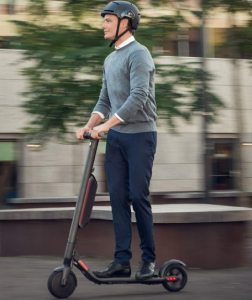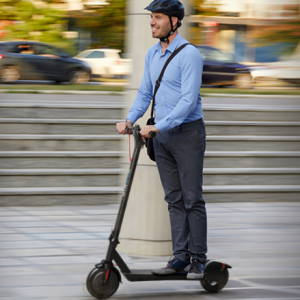Generally speaking, electric scooters are not required, but it is necessary to know the details of local laws and regulations.
Legal Requirements for Electric Scooters
Electric scooters, a popular mode of urban transport, are subject to specific legal requirements that vary by region. These requirements often include licensing, age restrictions, and identification protocols to ensure the safe and legal operation of these vehicles.
License Requirements
Many countries mandate a specific type of license for electric scooter riders. For instance, in certain jurisdictions, a basic driver’s license might suffice, while others may require a special category or class of license. The key is to ensure riders are competent in handling an electric scooter, which can reach speeds of up to 25 km/h (15 mph). Licensing often includes a test to assess the rider’s knowledge of road rules and scooter operation.
Age and Identification
Age restrictions play a critical role in electric scooter usage. Generally, the minimum age requirement ranges from 16 to 18 years. This age criterion is crucial for ensuring that riders possess the necessary judgment and skills for safe riding. Additionally, riders are often required to provide valid identification when renting electric scooters from service providers. This ID verification helps in maintaining records and enforcing accountability in case of traffic violations or accidents.
The legal landscape for electric scooters continues to evolve as these vehicles become more integrated into urban transport systems. Complying with local laws, including understanding the specifics of power output (usually under 500 Watts for standard models), cost implications, and safety specifications, is essential for both casual and regular users. The emphasis on aspects like efficiency, budget considerations, and lifespan (typically 1-3 years for battery life) also plays into the legal and practical aspects of electric scooter use. Materials used in construction and their quality directly impact the scooter’s durability and speed capabilities, with most scooters averaging a speed of 15-25 km/h. While electric scooters offer the advantage of cost-effectiveness and environmental friendliness, potential downsides like limited range (usually 25-40 km per charge) and maintenance costs should also be considered.
Safety Regulations for Electric Scooters
Electric scooters, while offering a convenient mode of travel, come with their own set of safety regulations to ensure the well-being of riders and pedestrians. These regulations encompass helmet laws, road safety rules, and other measures designed to minimize accidents and injuries.
Helmet Laws
Wearing a helmet while riding an electric scooter is not just a safety recommendation; in many places, it’s a legal requirement. These laws typically stipulate:
- Age-specific Regulations: Often, riders below a certain age (commonly 18 years) must wear helmets.
- Helmet Standards: Helmets must meet specific safety standards, ensuring they provide adequate protection.
- Penalties for Non-Compliance: Riders failing to adhere to helmet laws may face fines or other penalties.
Road Safety Rules
Road safety rules for electric scooters are crafted to ensure that both riders and other road users are safe. Key rules include:
- Speed Limits: Most electric scooters have a maximum speed limit of around 25 km/h (15 mph), but certain areas might impose lower speed limits.
- Riding Lanes: Riders must use designated bike lanes or stay to the right side of the road, where bike lanes are unavailable.
- Signal Use: Riders should use hand signals to indicate turns and stops, enhancing communication with other road users.
- No Riding on Sidewalks: In many places, riding electric scooters on sidewalks is prohibited to protect pedestrians.
- Parking Regulations: Scooters must be parked in designated areas to avoid obstructing pedestrian paths.
Comparing Electric Scooter Laws by Country
Electric scooter regulations vary significantly across different countries, reflecting diverse approaches to safety, traffic management, and urban planning. This comparison highlights the key legal aspects of electric scooter use in the USA, Europe, and Asia.
USA
Electric scooter laws in the United States vary from state to state, with some commonalities:
- License Requirements: Some states require a driver’s license, while others do not.
- Age Restrictions: The minimum age for riding ranges from 16 to 18 years.
- Helmet Laws: Helmet use is mandatory for certain age groups in some states.
- Speed and Power Limits: Electric scooters typically have a power limit of 750 Watts and a maximum speed of 20 mph (32 km/h).
Europe
European countries have somewhat uniform regulations with some local variations:
- License and Insurance: In many European countries, electric scooters require no license, but insurance may be mandatory.
- Age Restrictions: Generally, the minimum age is 16 years, but this can vary.
- Helmet Laws: Helmet use is often recommended and sometimes required for minors.
- Speed and Power Limits: The standard power limit is 250 Watts with a maximum speed of 25 km/h (15 mph).
Asia
Asian countries have diverse laws regarding electric scooters, reflecting different urban environments and traffic conditions:
- License Requirements: In many Asian countries, electric scooters require a driving license.
- Age Restrictions: The minimum age varies, with 16 years being a common standard.
- Helmet Laws: Helmets are generally mandatory for all riders.
- Speed and Power Limits: Power limits and speed restrictions vary widely, with some countries allowing up to 500 Watts.
Insurance and Electric Scooters
Insurance for electric scooters is an essential consideration for riders, offering protection against accidents, theft, and liability. Understanding the types of insurance available and identifying reliable insurance providers are key steps for any electric scooter owner.
Types of Insurance
Different types of insurance cater to various aspects of electric scooter use:
- Liability Insurance: This covers damages or injuries caused to others while using the scooter. It’s often the most basic and sometimes legally required type of insurance.
- Collision Insurance: This covers damage to the scooter itself in the event of an accident, regardless of fault.
- Comprehensive Insurance: This type of insurance covers non-collision-related incidents, such as theft, vandalism, or damage from natural disasters.
- Personal Injury Protection (PIP): PIP covers medical expenses for the rider and potentially passengers in the event of an accident.
- Uninsured/Underinsured Motorist Coverage: This protects the rider in case they are involved in an accident with a driver who does not have sufficient insurance.
Insurance Providers
Several insurance companies offer specialized electric scooter insurance policies. When choosing a provider, consider factors like:
- Coverage Options: Look for a provider that offers a range of coverage options to suit your specific needs.
- Cost and Deductibles: Compare the premiums and deductibles. Sometimes a lower premium can mean a higher deductible.
- Customer Reviews and Ratings: Check customer feedback to gauge the provider’s service quality and claim processing efficiency.
- Policy Flexibility: Some providers offer more flexible policies, such as temporary or pay-as-you-go insurance, which can be beneficial for occasional riders.



